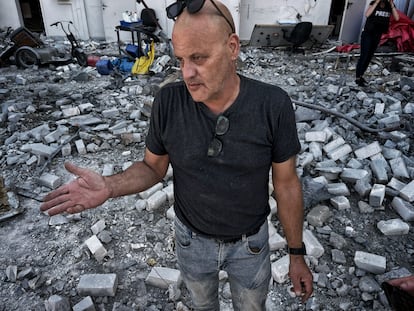Timely evacuation prevented deaths at Israeli hospital targeted by Iran: ‘We’ve been working all week to move people’
The Soroka medical center, near Gaza, often receives soldiers wounded in attacks in the Strip and hostages freed by Hamas


The impact of a projectile on Thursday on one of the buildings at the Soroka Hospital (Beersheba), one of the most important medical centers in southern Israel, could have caused a tragedy. The damage is extensive, but no one was killed. Around 40 people sustained minor injuries, most of them employees. Israeli authorities had anticipated that these facilities could be targeted amid the current escalation between Israel and Iran and had taken the precaution of evacuating patients.
At around 7:00 a.m., the air raid sirens went off, and minutes later, the wave of projectiles began to arrive. “I was 20 meters away from here, underground, and we felt a very strong explosion, but I wasn’t scared,” explains Adrián Kenigson, 57, a carpenter at the health center, surrounded by debris.
Eight hours later, sheets of metal and window frames were still hanging loose, their stability undermined by the light wind. The top floor of the building collapsed onto the floor below and is threatening to crumble further. This wing, in addition to a street-level dining room, was used for some surgical operations and pediatric and ophthalmology patients. However, it had been evacuated.
“We’ve been working hard all week to move people from less secure areas,” adds Kenigson, who is originally from Argentina. These operations, combined with the well-established protocol, with which the population is very familiar when the sirens sound ahead of a possible attack, helped minimize personal injuries, he adds. The last patients were removed from the building the previous day.
Kenigson is still shocked by what happened, even though he knows he lives in a country at war. Without that foresight, “a massacre could have occurred,” he says, gesturing to the ground covered in rubble and debris from the building.
Moments earlier, at the same location, Israeli Foreign Minister Gideon Sa’ar, surrounded by dozens of reporters, had no doubt that the attack was “clearly a war crime.” He insisted that the Iranian regime was “deliberately” attacking civilians, while the Israeli army was targeting military and nuclear facilities, warning the local population in advance to evacuate.
But Iran’s internet communications have been restricted for several days, so warning residents in the way Israel does is often of little use. When Minister Sa’ar was asked what his country was doing to prevent civilian deaths, he didn’t mention this communications blackout and defended the military’s approach, while maintaining that Israel “has nothing against the Iranian population.”
The Islamic regime, for its part, claims it fired at Israeli military installations and that the blast caused some “superficial damage” at the neighboring hospital, according to a statement from Foreign Minister Sayyid Abbas Araghchi. Tehran’s top diplomat defended the attack on the medical center near Gaza, citing the treatment of Israeli soldiers participating in the Palestinian “genocide,” and that the attacks by those troops “have destroyed or damaged 94%” of the Strip’s healthcare system.
When questioned about the military targets cited by Tehran, Sa’ar simply replied that all the fatalities, “without exception,” that have occurred in Israel due to Iranian attacks in recent days — 24 in total — are civilians. “That sums up the whole story,” he noted, without elaborating on the matter. He also did not clarify whether the damage caused to the hospital could have been due to debris from projectiles intercepted in the air by Israeli anti-missile defenses during the Iranian attack.
Unaffected by military decisions, as he emphasizes that he’s a man of the street, Kenigson comments that “there are military targets all over the country.” “Israel is a very small, very powerful country, and obviously there are bases everywhere, but I can’t say if they actually targeted the health center or some kind of base,” he adds.
The health center is operating at only 26% of its capacity after the attack and will only admit critical patients in the coming days, according to sources cited by local media. Soroka is a large complex located about 40 kilometers (25 miles) from the Gaza Strip, where the war that has claimed the lives of more than 55,000 Palestinians since October 2023 continues.
This proximity to the main theater of war gives the hospital great importance, as the Islamic Republic emphasized. On the one hand, it has received some of the hostages who have been freed from the Strip for medical check-ups. On the other, it is a regular location for Israeli soldiers fighting in Gaza to receive care.
Sign up for our weekly newsletter to get more English-language news coverage from EL PAÍS USA Edition
Tu suscripción se está usando en otro dispositivo
¿Quieres añadir otro usuario a tu suscripción?
Si continúas leyendo en este dispositivo, no se podrá leer en el otro.
FlechaTu suscripción se está usando en otro dispositivo y solo puedes acceder a EL PAÍS desde un dispositivo a la vez.
Si quieres compartir tu cuenta, cambia tu suscripción a la modalidad Premium, así podrás añadir otro usuario. Cada uno accederá con su propia cuenta de email, lo que os permitirá personalizar vuestra experiencia en EL PAÍS.
¿Tienes una suscripción de empresa? Accede aquí para contratar más cuentas.
En el caso de no saber quién está usando tu cuenta, te recomendamos cambiar tu contraseña aquí.
Si decides continuar compartiendo tu cuenta, este mensaje se mostrará en tu dispositivo y en el de la otra persona que está usando tu cuenta de forma indefinida, afectando a tu experiencia de lectura. Puedes consultar aquí los términos y condiciones de la suscripción digital.








































